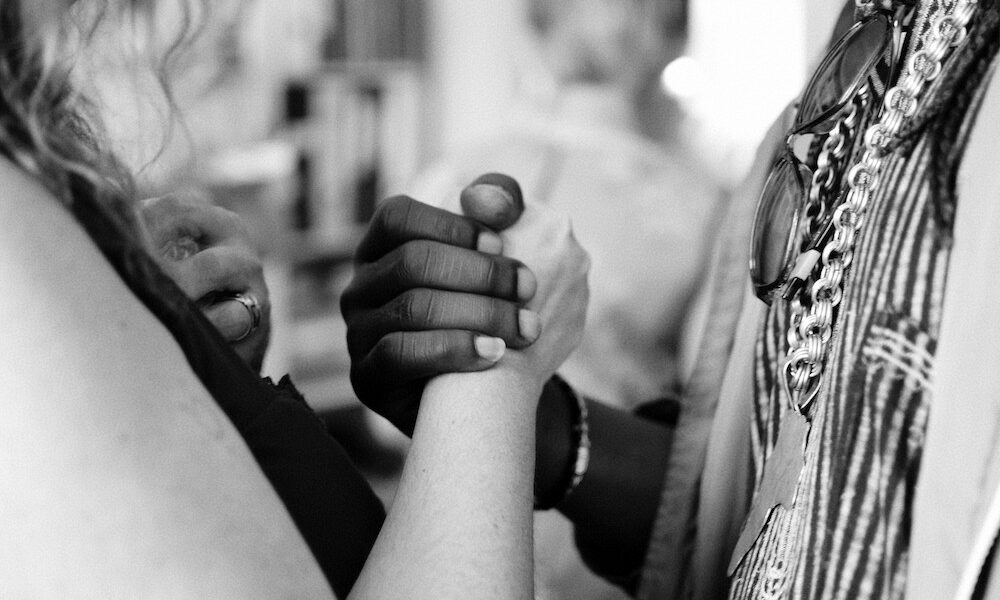Recent times have been tough — filled with greater self-awareness of our needs to survive grief and the collision of the world’s unresolved issues. Here’s why we need to come together as a community for truth-seeking, sustainable solutions, and healing.
BY: ASHLEY HOMRICH, RD, LDN
If you think about self-care, what comes to mind? Consistent nourishment and nutrient-dense meals? Movement? Relaxation and sleep?
While all of these are necessary parts for thriving, for years many in social justice spaces, non-profit circles, and community organizing have dared to say that self-care is not enough and that promoting it alone misses the mark to caring for our collective wellbeing.
As Nakita Valerio once said: “Shouting ‘self-care’ at people who actually need community care is how we fail people.”
So what exactly is community care? Here are 3 ways to recognize it:
1. You are never truly alone.
In a world filled with isolation, separation, and polarization, no amount of nutrient-dense meals or bubble baths will ‘fix’ our systemic issues.
Community care calls for coming together, having the difficult and necessary conversations, and lends us the zoomed-out view that no one is truly alone in their struggles. In fact, having access to a community within a walking distance actually increases life expectancy.
2. You see strength in asking for help.
Community care also invites in more celebration as joys are shared together and makes grieving a little bit more possible as the weight of the world was never ours to carry by ourselves.
It does not wait to reach out to those who may or may not ask for help, as it inherently recognizes how capitalism, individualism, and social conditioning has sold an illusion that asking for help is somehow a weakness — rather than a strength.
3. You recognize our shared humanity.
Community care passes down the inner wisdom that already resides in each of us and holds space for being — while recognizing the way food apartheid, gentrification, and redlining come with a cost to our collective wellbeing.
It extends the table to those who have been marginalized for generations — while calling in the actions of accountability, responsibility, and (re)learning when incidents like microaggressions occur and boundaries are crossed.
Ultimately, it shifts me to we, and reclaims the WE in wellness and wellbeing.
Imagine a world where conversations around eating tables are filled less with how much energy is in a food and more with, “How was your day?” and the radical vulnerability in sharing the honest good, bad, and all the in-between. This is how community care brings us together.
So how does an individual begin to shift into such collectiveness and a more expansive idea of care? Here are a few ways to get started:
- Recognize that each and everyone of us make up our systems. Therefore, systemic issues are our collective responsibility to address — with individual roles looking different amongst us.
- Hold meaningful, truth-seeking conversations over meals and drinks.
- Get to know your neighbor(s) and the people in your local and global communities.
- Create or join a local coalition or support circle.
- Get curious about when language holds power over others. Ask where it was learned and look for ways to shift the conversation to a more collective narrative.
- Embrace idle time, that time of just being together with no agenda. Allow others the space to breathe and be too.
After all, perhaps this is how we begin to heal our fragmentation, systemic issues, and collective wellbeing.
That in knowing self-care is a part of community care, it requires us to reconnect not only with ourselves — but others too.
HEADER IMAGE: AARON BLANCO TEJEDOR
Ashley Homrich, RD, LDN is a dietitian who recognizes the importance of advocating for a compassionate, equitable world and asking the deep, meaningful questions around societal issues. She is based out of the Appalachian region and owns Fuel to Flourish, where the mission is to strengthen and bring together communities through food, connection and self-care. When she is not working, she enjoys supporting small businesses and local artists, musicians, farmers, and restaurants as well as being with friends and family.

